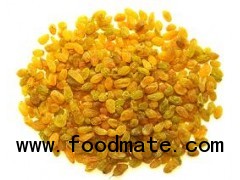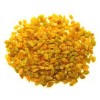Raisins are available in differant size and colors.They have a flavor similar to the grapes from which they are made, but the drying process which creates them concentrates the amount of sugar making them taste much sweeter. They are a naturally stable food and resist spoilage due to their low moisture and low pH.
Raisins are composed of
History
The technique of drying fruit was likely discovered by accident. It is conceivable that our ancestors came upon fallen fruit, which had dried in the sun, and discovered its sweetness after tasting it. Evidence has shown that raisins were produced by the Egyptians as early as 2000 B.C. Raisins specifically have been mentioned in ancient writings and it suggests that they were used for eating, treating illnesses, and even paying taxes.
Throughout the ages, wine making has been the most
Raw Materials
The primary raw material for making raisins is grapes. To make 1 Kg of raisins, over 4 Kg of fresh grapes are required. These grapes must have certain qualities in order to produce quality raisins. For example, they must ripen early and be easy to dry. Additionally, they must have a soft texture, not stick together when stored, have no seeds, and have a pleasing flavor. The most
By far, the most widely grown raisin grape is the Thompson Seedless variety. They are used in the production of over half the world's raisins.The Thompson was first developed in 1872 by William Thompson, who created it by taking cuttings from an English seedless grape and grafting them with a Muscat grape vine. The resulting plant produced the first Thompson seedless grapes. It is believed that all of the subsequent Thompson seedless vines came from this original grafting.
The Thompson seedless is a white, thinskinned grape, which produces the best raisins available today. Its small berries are oval and elongated. It does not contain seeds and has a high sugar content. From a raisin production standpoint, Thompson grapes are ideal because they ripen fairly early in the season and do not stick to each other during shipping.Two minor varieties of grape that find some use as raisins include the Sonakka and the Rudstalk. The Fiesta is a white seedless grape with a good flavor. A major problem with these grapes is that their stems are more difficult to remove. The Sonakka raisin variety is long in size.








